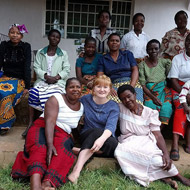
Vets and students recognised at BVA Members' Day
A number of vets received awards celebrating their achievements at BVA Members’ Day (20 September).
The awards included BVA awards for outstanding contributions to veterinary science and services to the profession in the UK and developing countries. They also included travel awards for veterinary students and recent graduates and contributions to BVA Council.
Professor Julie Fitzpatrick OBE was awarded the Dairymple-Champneys Cup and Medal for work of outstanding merit. Professor Fitzpatrick was honoured in recognition of her significant work leading research into livestock health and welfare.
Dr Anthony Andrews received the Chiron Award for his lifetime’s work advancing expertise and specialism in the ruminant sector. The award for outstanding contributions to veterinary science, or for outstanding services to the profession, is judged as being of a calibre commanding international or inter-professional recognition.
Winchester’s David Harwood won the Bieby Cup in honour of his outstanding contribution to BVA Council, particularly in relation to goat welfare.
Helen Inzani received the Harry Steele-Bodger Memorial Scholarship for her project working with vets and scientists to rehabilitate birds of prey and learn about the techniques they use.
BVA Overseas Travel Grants were presented to Rosie Bartholomew (Edinburgh) for a project she undertook earlier this year on the challenges faced by female dairy farmers in Malawi, and to Rachel Hartley Young (Cambridge) for her study on the estimates of feline populations in the Galapagos.
More than 100 delegates attended BVA members’ Day at the National STEM Learning Centre in York. In his final presidential address, BVA president John Fishwick said that the veterinary profession will need to work together to weather challenges ahead and push for the best possible outcomes for animal welfare and workforce resilience.
“We see a strong veterinary workforce as being the key piece of the puzzle to ensure that all the other relevant matters relating to trade, agriculture, animal welfare, animal health and public health play out smoothly in a post-Brexit world,” he said. “This work will continue well past 2019, as we along with everyone else try to navigate a very different and unpredictable new policy landscape.”
Image (C) BVA



 The Animal and Plant Health Agency (APHA) has updated its online reporting service for dead wild birds.
The Animal and Plant Health Agency (APHA) has updated its online reporting service for dead wild birds.